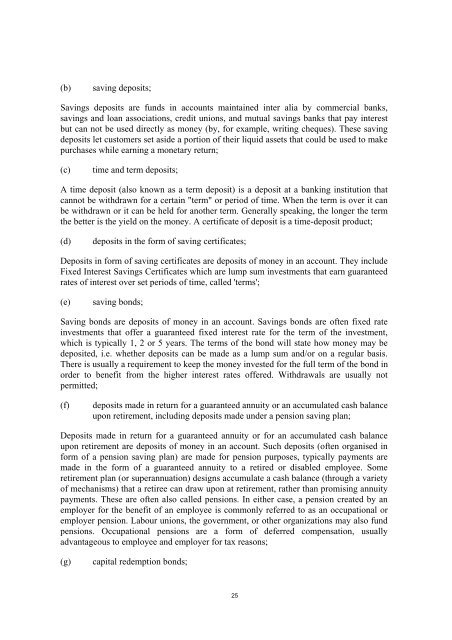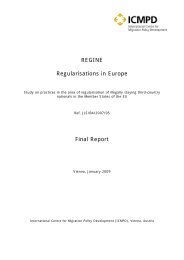taxud/2414/08 - European Commission - Europa
taxud/2414/08 - European Commission - Europa
taxud/2414/08 - European Commission - Europa
You also want an ePaper? Increase the reach of your titles
YUMPU automatically turns print PDFs into web optimized ePapers that Google loves.
(b)<br />
saving deposits;<br />
Savings deposits are funds in accounts maintained inter alia by commercial banks,<br />
savings and loan associations, credit unions, and mutual savings banks that pay interest<br />
but can not be used directly as money (by, for example, writing cheques). These saving<br />
deposits let customers set aside a portion of their liquid assets that could be used to make<br />
purchases while earning a monetary return;<br />
(c)<br />
time and term deposits;<br />
A time deposit (also known as a term deposit) is a deposit at a banking institution that<br />
cannot be withdrawn for a certain "term" or period of time. When the term is over it can<br />
be withdrawn or it can be held for another term. Generally speaking, the longer the term<br />
the better is the yield on the money. A certificate of deposit is a time-deposit product;<br />
(d)<br />
deposits in the form of saving certificates;<br />
Deposits in form of saving certificates are deposits of money in an account. They include<br />
Fixed Interest Savings Certificates which are lump sum investments that earn guaranteed<br />
rates of interest over set periods of time, called 'terms';<br />
(e)<br />
saving bonds;<br />
Saving bonds are deposits of money in an account. Savings bonds are often fixed rate<br />
investments that offer a guaranteed fixed interest rate for the term of the investment,<br />
which is typically 1, 2 or 5 years. The terms of the bond will state how money may be<br />
deposited, i.e. whether deposits can be made as a lump sum and/or on a regular basis.<br />
There is usually a requirement to keep the money invested for the full term of the bond in<br />
order to benefit from the higher interest rates offered. Withdrawals are usually not<br />
permitted;<br />
(f)<br />
deposits made in return for a guaranteed annuity or an accumulated cash balance<br />
upon retirement, including deposits made under a pension saving plan;<br />
Deposits made in return for a guaranteed annuity or for an accumulated cash balance<br />
upon retirement are deposits of money in an account. Such deposits (often organised in<br />
form of a pension saving plan) are made for pension purposes, typically payments are<br />
made in the form of a guaranteed annuity to a retired or disabled employee. Some<br />
retirement plan (or superannuation) designs accumulate a cash balance (through a variety<br />
of mechanisms) that a retiree can draw upon at retirement, rather than promising annuity<br />
payments. These are often also called pensions. In either case, a pension created by an<br />
employer for the benefit of an employee is commonly referred to as an occupational or<br />
employer pension. Labour unions, the government, or other organizations may also fund<br />
pensions. Occupational pensions are a form of deferred compensation, usually<br />
advantageous to employee and employer for tax reasons;<br />
(g)<br />
capital redemption bonds;<br />
25
















